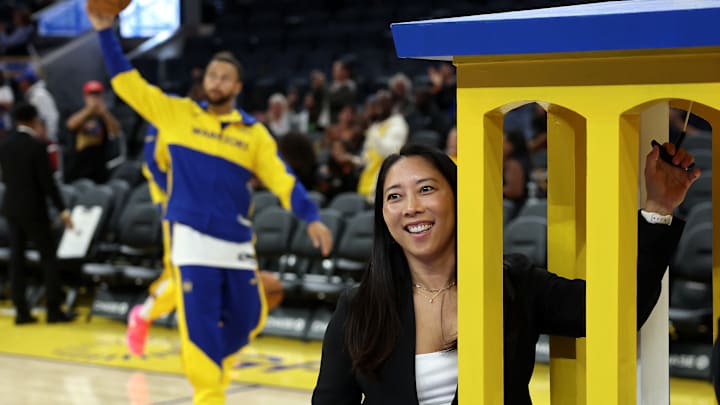The Golden State franchise will officially have its second team when the Valkyries make their WNBA debut in May next year, providing Warriors fans with another squad to root for in the Bay Area.
There's plenty to be sorted through before the Valkyries officially hit the floor under head coach Natalie Nakase, but there are already steps in place to ensure they can achieve sustained success as early as possible.
3 Aspects Valkyries must try and take from Warriors
Fortunately, the Valkyries have a fairly effective template to follow in the form of their NBA counterpart. No team has had greater success over the past decade than the Warriors, with the team bringing home four NBA championships along with two additional trips to the Finals.
How exactly have they done it? Let's look at three aspects the Valkyries can already take from the Warriors to try and become a contender in the WNBA:
1. Remaining patient
The Warriors' recent success was born from both good management and good fortune. It's easy to forget about a pair of sliding doors moments that could have drastically altered the fate of the franchise.
The first one was in 2012 when Golden State was about to trade Stephen Curry to Milwaukee only for the Bucks to decline due to concerns surrounding his ankle issues. That was perhaps more good luck than good fortune, but the next big trade moment was certainly a case of remaining patient with what they had.
A year prior to their 2015 championship, the Warriors were ever so close to sending Klay Thompson to the Minnesota Timberwolves as part of a deal for All-Star big man Kevin Love. Jerry West famously threatened to quit his role with the franchise if they went through with the trade, urging ownership and the rest of the front office to keep the SplashBrothers together. The rest, as they say, is history.
Even today, the Warriors are still exercising patience. They could have traded for Paul George and/or Lauri Markkanen during the offseason, yet were ultimately unwilling to include young players like Brandin Podziemski and Jonathan Kuminga. Time will tell whether or not that actually pays off, but it's a strategy Golden State has often undertaken, and that could translate to their WNBA program.
2. Prioritize continuity
Along the same lines of remaining patient, the Warriors have prioritized continuity over the past decade. They drafted Curry, Thompson, and Draymond Green and developed them into home-grown stars. They're now trying to do the same with their current group of young players.
Sometimes, it can be detrimental, but it's largely underpinned their enormous success. Golden State may have won championships in 2017 and 2018 with an overwhelming amount of talent, but their triumph in 2022 had so much to do with the continuity and subsequent chemistry they had built.
Sure, Curry was absolutely brilliant on an individual level, but even just think about how impactful Thompson was only months after his return from two devastating leg injuries. That return isn't as seamless without the extensive history he had playing with Curry, Green, Andre Iguodala, and Kevon Looney.
The continuity extends far beyond the playing roster too. Steve Kerr is now in his 11th season as head coach, and Bob Myers was GM/President of Basketball Operations for 11 years before passing over to his understudy, Mike Dunleavy Jr., in 2023.
3. Build an unselfish culture
How do you build continuity? By laying the foundation of an unselfish culture where players can thrive without feeling the desire to go out and think they can be (or do) more with a rival team. There's no player who has embodied that more than Curry, particularly following the arrival of Kevin Durant in 2016.
There are very few superstars who would have been so willing to take a slight backseat to allow another MVP-calibre player to come in and do their thing. That's exactly what Curry did with Golden State's offensive system under Kerr also predicated on unselfishness where the ball constantly moves.
The Warriors have certainly worked on an ideology of prioritizing team success first and foremost, with individual accolades sure to come if that ethos is followed. You better believe the Valkyries will be trying to implement the same approach, yet it's far easier said than done and requires not just the right athletes but, more importantly, the right people.
